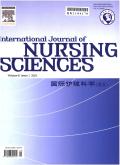Psychometric testing of the cross-culturally adapted Thai version of the Self-Care Self-Efficacy Scale version 3.0 in individuals with chronic illnesses
IF 3.1
3区 医学
Q1 NURSING
引用次数: 0
Abstract
Objective
To assess the psychometric properties of the Thai version of the Self-Care Self-Efficacy Scale version 3.0 (SCSES-v3.0) in individuals with chronic illnesses. Although originally developed and tested in a Western context, its applicability in Asian populations, including Thailand, remains inadequately explored.
Methods
Psychometric tests were guided by COSMIN principles. This included the translation of the English version into Thai based on the ISPOR framework. Nine nursing experts evaluated the content validity. Data were obtained from a multicenter cross-sectional study conducted between July and November 2022. This study included individuals with chronic conditions from 16 primary care centers in Thailand. We tested the structural validity using exploratory factor analysis (EFA) and confirmatory factor analysis (CFA), and concurrent validity in relation to the Self-Care of Chronic Illness Inventory version 4.c (SC-CII-v4.c). We tested the scale’s reliability with McDonald’s ω, Cronbach’s α, and the intraclass correlation coefficient (ICC).
Results
The Thai SCSES-v3.0 demonstrated excellent content validity (k = 1.00). The final analysis included a total of 385 participants. The EFA with the first split-half subsample (n = 193) extracted a two-factor structure. One reflected SCSES for maintenance and monitoring behaviors and another captured SCSES for management behaviors (item 6–10). CFA with the second split-half subsample (n = 192) and the overall sample (n = 385) supported the scale’s two-factor model with high factor loadings. Each dimension and the overall SCSES-v3.0 positively correlated with each scale and the overall SC-CII-v4.c. McDonald’s ω and Cronbach’s α (both ranged 0.91–0.94) and ICC (ranged 0.95–0.96), indicated excellent internal reliability and test-retest reliability, respectively.
Conclusions
The identification of a valid and reliable two-factor model for the Thai SCSES-v3.0 renders it a valuable tool for clinicians and investigators, facilitating the assessment of self-efficacy in self-care across diverse contexts.
跨文化改编的泰语版自我护理自我效能感量表 3.0 在慢性病患者中的心理测试
目的 评估泰语版自我护理效能感量表 3.0(SCSES-v3.0)在慢性病患者中的心理测量特性。尽管该量表最初是在西方背景下开发和测试的,但在包括泰国在内的亚洲人群中的适用性仍未得到充分探讨。其中包括根据 ISPOR 框架将英文版翻译成泰文。九位护理专家对内容有效性进行了评估。数据来自于 2022 年 7 月至 11 月间进行的一项多中心横断面研究。研究对象包括泰国 16 个初级护理中心的慢性病患者。我们使用探索性因子分析(EFA)和确证性因子分析(CFA)测试了结构效度,并结合慢性病自我护理量表 4.c 版(SC-CII-v4.c)测试了并发效度。我们用 McDonald'sω、Cronbach's α 和类内相关系数 (ICC) 测试了量表的信度。最终分析共包括 385 名参与者。对第一个半分子样本(n = 193)进行的 EFA 提取出了一个双因素结构。一个因素反映了维护和监控行为的 SCSES,另一个因素则反映了管理行为的 SCSES(项目 6-10)。第二个半分子样本(n = 192)和总体样本(n = 385)的 CFA 支持量表的双因子模型,且因子载荷较高。McDonald's ω和Cronbach's α(范围均为0.91-0.94)以及ICC(范围为0.95-0.96)分别显示了良好的内部信度和重测信度。结论泰国 SCSES-v3.0 确定了有效和可靠的双因素模型,使其成为临床医生和研究人员的重要工具,有助于在不同环境下评估自我保健的自我效能感。
本文章由计算机程序翻译,如有差异,请以英文原文为准。
求助全文
约1分钟内获得全文
求助全文
来源期刊

International Journal of Nursing Sciences
Nursing-Nursing (all)
CiteScore
6.10
自引率
2.60%
发文量
408
审稿时长
25 days
期刊介绍:
This journal aims to promote excellence in nursing and health care through the dissemination of the latest, evidence-based, peer-reviewed clinical information and original research, providing an international platform for exchanging knowledge, research findings and nursing practice experience. This journal covers a wide range of nursing topics such as advanced nursing practice, bio-psychosocial issues related to health, cultural perspectives, lifestyle change as a component of health promotion, chronic disease, including end-of-life care, family care giving. IJNSS publishes four issues per year in Jan/Apr/Jul/Oct. IJNSS intended readership includes practicing nurses in all spheres and at all levels who are committed to advancing practice and professional development on the basis of new knowledge and evidence; managers and senior members of the nursing; nurse educators and nursing students etc. IJNSS seeks to enrich insight into clinical need and the implications for nursing intervention and models of service delivery. Contributions are welcomed from other health professions on issues that have a direct impact on nursing practice.
 求助内容:
求助内容: 应助结果提醒方式:
应助结果提醒方式:


